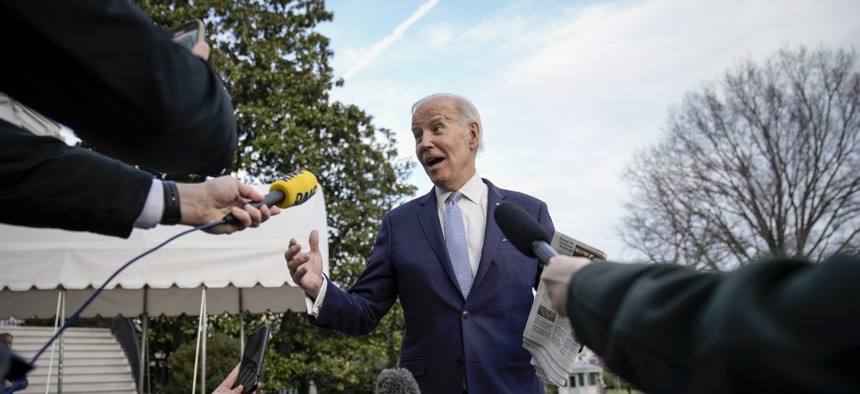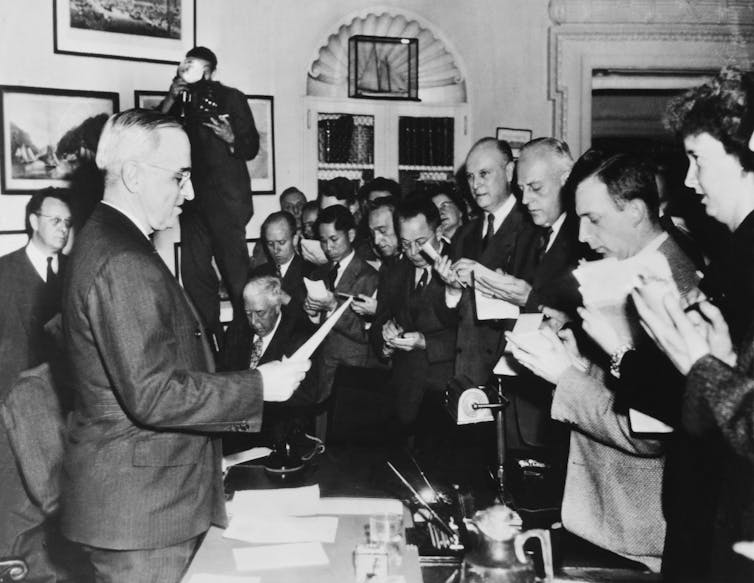All Presidents Avoid Reporters, But Biden May Achieve a Record in His Press Avoidance

Drew Angerer/Getty
Democracy demands accountability, but press conferences are risky business for presidents nowadays.
Bill Clinton was in a major scandal – based in large part on getting caught in a deception during a media interview – and successfully outsourced his White House press briefings to legal counsel to avoid having his press secretary or himself trapped by tough media questioning.
Barack Obama campaigned on being the most transparent president in history and then prosecuted reporters as criminals.
But well into the third year of Joe Biden’s presidency, he has held fewer press conferences than any president in recent memory.
There’s a reason that Biden – and all the other presidents – want to avoid the press: While democracy may demand such accountability from a president, press conferences definitely are risky for them.
Avoidance becomes the norm
It took Biden until late March 2021 to hold his first press conference, more than two months after his inauguration – the longest a new president had gone without holding a press conference in 100 years.
During Biden’s first year in office, he held a total of 10 press conferences. Most of those featured him reading prepared remarks and then leaving without taking questions from reporters. When he does take questions, he tends to call on only preselected reporters from – in his own words – “a list I’ve been given.”
As a scholar of political communication and public relations, I have found through my research that public figures such as celebrities and sports stars in the age of social media are no longer concerned with answering reporters’ questions, holding press conferences or giving interviews.
Why should LeBron James care about reporters when he can share his unfiltered opinions freely and instantly with his 146 million Instagram followers and his 53 million Twitter followers?
Donald Trump brought this perspective to the country’s highest office, tweeting about the presidency and ignoring and insulting reporters to their faces.
While Biden doesn’t trash the press the way Trump did, he hardly speaks to the public.
The White House press secretary routinely refuses to answer reporters’ questions. Washington Post media reporter Paul Farhi wrote in January 2023 that press secretary Karine Jean-Pierre repeatedly responded to questions about classified documents found in Biden’s home and former office “by essentially not responding.”
Risky business
I have published studies of presidential press conferences, looking at the effects of journalists’ asking tough questions. I have explored theories about politicians’ different strategies with the press and observed the effects on voters.
Critics point to various motives Biden might have for avoiding the press - and even so, late-night comics appear to have plenty of fodder from him. But empirical evidence and my research suggest that there are multiple reasons no president should want to give a press conference.
Understanding those risks does not mean I am justifying press avoidance by presidents. As a former journalist and a political campaign director for both Democrats and Republicans, I believe that public servants are derelict in their duties if they refuse to face the press. I’m not alone: The White House Correspondents’ Association accused Biden in 2021 of lacking “accountability to the public.” And in June 2022, a group of White House reporters officially complained about Biden’s inaccessibility , accusing him of practices “antithetical” to the “concept of a free press,” noting that “every other president before Biden (including Trump) allowed full access to the very same spaces.”

Dodging questions – or not
The first reason to avoid a press conference is that reporters may accuse the president of dodging questions. And viewers are likely to believe the allegations – regardless of what the president actually said. The tendency of political journalists to accuse presidents of deflecting questions has increased in recent decades and has become fairly common.
During the 2020 campaign, Biden was accused of dodging questions by numerous media outlets. A campaign spokesperson was even accused of dodging a question about Biden dodging questions.
I ran an experiment testing the effects of a journalist’s accusing politicians of evasion.
The voters in the study all saw the same questions and answers. For half of the voters, though, I edited the video to insert the journalist accusing the politician of dodging in an answer.
Voters who saw the journalist making the allegation believed the politician indeed dodged. Voters who saw the identical interview without the allegation of evasion thought the politician gave adequate answers.
What’s more: The politician shown in the experiment had not actually dodged. Voters seem to believe a reporter and disbelieve a politician.
No good answer
A second reason to avoid press conferences is that questions will tend to be unanswerable. As has been documented by decades of data, journalists frequently ask about divisive or controversial topics, and they word their questions in tricky ways.
There is no politically advantageous answer to such questions. Based on my research, journalists covering the White House tend to ask about topics that divide the country – such as abortion or gun control – for which any direct answer would offend some group of voters.
You can’t win
A third reason is that even if a question is not divisive, and the president answers it, many voters will still think the president is being deceptive.
I ran an experiment in which I filmed an interview of a politician either dodging or answering a journalist’s question. Regardless of what the politician actually said, Republican voters thought the politician was deceptive when he was a Democrat, and vice versa for Democratic voters.
Simply by having a party label, a president’s press conference will likely be skewed through a partisan lens no matter what he says.

TMI – too much information
A final reason for a president to avoid giving a press conference: The more the public gets to know a president, the more they dislike him.
My own research has revealed why a president might become more unpresidential the more he holds press conferences. The more a politician’s words inevitably diverge from voters’ feelings and experiences, the less presidential he will seem to them.
Altogether, presidents probably will lose stature by holding a press conference. Journalists hold the upper hand, asking questions that pose a rhetorical minefield and wielding the power to accuse the president of evasion. And voters will tend to believe journalists’ criticism of the president even if a president honestly answers their questions.
Of course, if what the president is aiming for is not strategic expediency but simply fulfilling an obligation to be held accountable in his role, then the country wins when he holds a press conference – and in that way he does, too.
This story substantially updates a story originally published on March 19, 2021.
![]()
David E. Clementson, Assistant Professor in the Grady College of Journalism and Mass Communication, University of Georgia
This article is republished from The Conversation under a Creative Commons license. Read the original article.
NEXT STORY: New Map Covers All Matter in the Universe





